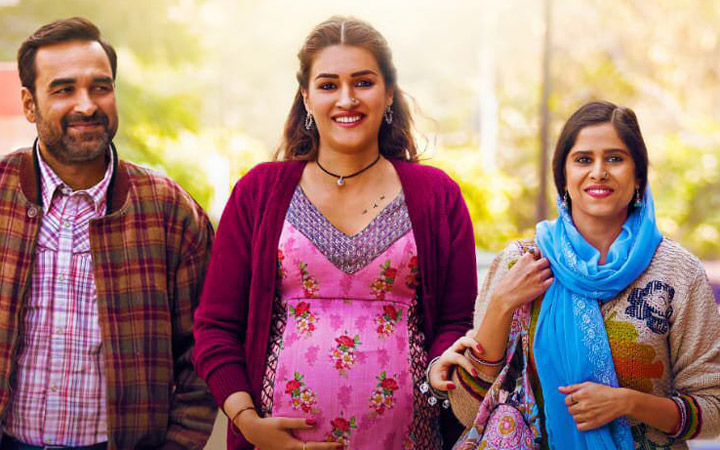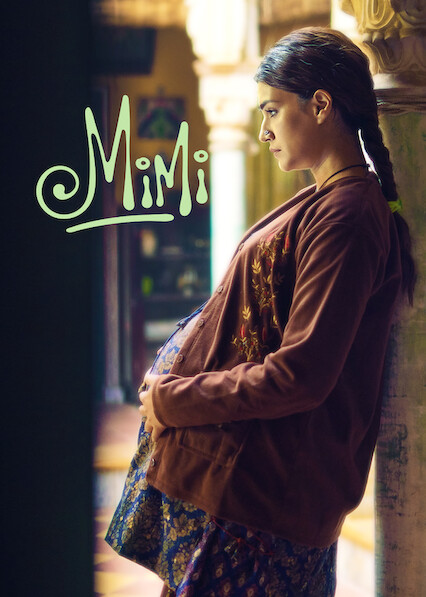Written and directed by Laxman Utekar and co-written by Rohan Shankar, Mimi is a Hindi comedy-drama starring Kriti Sanon, Sai Thamhankar, Evelyn Edwards and Pankaj Tripathi in lead roles.
A remake of the Marathi film Mala Aai Vhhaychy! by Samruddhi Porey, Mimi takes us through the life of an Indian surrogate abandoned by the biological parents of the baby at an advanced stage of the pregnancy.
Mimi Rathore (Kriti Sanon), is a dancer and aspiring actor residing in Rajasthan. It is Mimi’s life’s dream to move to Mumbai and become a Bollywood star, but she finds herself restricted by financial constraints that delay the relocation. She is approached by John (Aiden Whytock) and Summer (Evelyn Edwards), an American couple who are on the search for a healthy surrogate to bear them a child.
With the help of the local taxi driver Bhanu (Pankaj Tripathi), the couple manage to convince Mimi to agree to the surrogacy in exchange for a huge amount of money. Mimi considers this as a chance to pursue her future in the movies.
She soon moves into her friend Shama’s ( Sai Thamhankar) house after the pregnancy is confirmed by the doctor. Well ahead into the pregnancy, the doctor diagnoses the possibility of the birth of a child with disability. The couple abandons the surrogacy and leaves the country, asking Mimi to abort the foetus. The rest of the film follows how she chooses to handle this predicament.
New mothers experience a range of emotions spanning extreme mirth to anxiety and clinical depression. It is fair for the film to assume that Mimi felt irreversible joy after holding the baby in her hands. But what is hard to digest is how she abandons her acting aspirations for which she fought numerous battles at home and with herself

Surrogacy is an issue that has complex legal, social, financial and moral connotations in a third world country like India. Many women from marginalised, low-income groups often look at it as a viable method to propel themselves and their families out of poverty.
It is necessary to invoke this context in order for us to analyse the damage that a mainstream Bollywood film like Mimi does to the conversations on the bodily autonomy of women with the way it handles the theme.
The rest of this article contains plot spoilers. Kindly consider this as a spoiler alert.

Mimi is initially devastated after being abandoned by the biological parents of the child. But in a jiffy, she finds herself feeling undeniably maternal and owns the child as her own. Human emotions cannot always be boxed into rigid compartments. The sentiments of a woman, even one who had no inkling of excitement about becoming a mother, might vary after childbirth.
New mothers experience a range of emotions spanning extreme mirth to anxiety and clinical depression. It is fair for the film to assume that Mimi felt irreversible joy after holding the baby in her hands. But what is hard to digest is how she abandons her acting aspirations for which she fought numerous battles at home and with herself. She accepts her destiny without question and submits herself into the new role, with a sudden, dramatic sense of duty.

The problem lies with the fact that the film tries to standardise the fluctuating emotional graph of a new mother and reduces it to the biggest and only role in her life ahead. Her parents who were in the dark about the pregnancy immediately make peace with it, especially after finding out that child is White skinned, unlike any other child in the locality. The blatant trivialisation of colourism in those sequences is infuriating, to say the least.
Picking on the problematic elements in this film is a tough task, because one will be spoilt for choice. But what is most defeating is how it fortifies the patriarchal ideals of motherhood and elevates it to divinity. As always, this deification is accompanied by patriarchy’s most loyal sidekick, religion.

Commenting on women and religion, Jude Anthany Joseph’s Malayalam film Sara’s starring Anna Ben in the lead was released recently on Amazon Prime. It tells the story of Sara (Anna Ben), a woman who has maintained from her childhood that she does not want to become a mother. The trailer of the film begins with a verse from the Bible about Abaraham and his wife Sara and the God’s promise to them of the birth of a son.
In the film, Sara conceives as a result of contraception failure and declares that she does not want to continue with the pregnancy. In a scene where she is confronted by her mother-in-law about the same, arguments about God, the divinity of life and the need for the continuity of progeny are stacked up against her.
Similarly, in Don Palathara’s single take Malayalam film Santhoshathinte Onnam Rahasyam (Joyful Mystery), the lead couple played by Rima Kallingal and Jithin Puthenchery are in a car journey to find out if Maria (Rima Kallingal) is pregnant. The suspected pregnancy is accidental, and the couple goes through myriad emotional tugs of war throughout the journey.
Also read: Film Review: Sara’s — A Refreshing Take On The Deification Of Motherhood
The title of the film, the literal translation of which is – The First Secret to Happiness, has a Biblical reference to the Annunciation of Mary. It pertains to the announcement made to Mary by Angel Gabriel that she will conceive and birth Jesus, the son of God. Mary, who at the time is a virgin, unmarried woman living in an orthodox, patriarchal society is given no agency over her body. It is “announced” to her, not even suggested, let alone requested.
Patriarchy and its beloved confidante religion, have made sure that women are trapped within a structure that puts them in jarring moral and emotional dilemmas when it comes to their own bodies. Films like Sara’s and Santhoshathinte Onnam Rahasyam try to cut through this complex wireframe to highlight the fact that the power of decision making must always remain with the woman, and not the structures that have worked towards making an obedient follower out of her.
Santhoshatinte Onnam Rahasyam delves deep into the emotional, hormonal and social burdens of a woman, and showcases how overwhelming it is for her to have a child while also battling the impending fear of being left without help to manage domestic chores, work and the child in the gendered space that most families/heterosexual relationships are.
While Maria and Sara from Santhoshatinte Onnam Rahasyam and Sara’s respectively explore the OTT space to tell more honest stories about women, motherhood, privilege and agency, Mimi pledges allegiance to Bollywood’s objectionable, popular, skewed templates of them by shutting down the abortion conversation with a strong tone of judgment
Sara’s also emphasises on the fact that no matter how religion, society or family feels about a woman’s body, it is her peace, well being and agency that matters. The film uses a senior doctor character to explain this and stress on the legal autonomy conferred on women through the Medical Termination of Pregnancy Act.
Both these films that released recently, position women as individuals with more to themselves, torn between the oppressive structures that keep them from making independent decisions. They contrast what is expected of them and pave way for critical introspection. It is impossible to not read Mimi in juxtaposition to how these films handle female agency.

Mimi glosses over these aspects and goes overboard with the sentimentalisation of motherhood. It is true that many surrogates are abandoned mid-pregnancy by the biological parents. This causes daunting emotional and financial strain on the women, who venture into the arrangement itself for the money they are offered.
To portray such an unimaginably taxing experience as an opportunity to peddle the “glory” in maternal sacrifice is not only a disservice to those who go through it, but a gross misrepresentation of facts even if we account for cinematic liberty.
This is not to dictate what choice Mimi should have made with respect to the pregnancy or the kind of mother she wants to be, but to point out the problematic reduction of her rightful agency and individuality into the society’s expectations of maternity. While she recognises that she has given up her dreams for the child, the film confers it on her and women in general as an ideal choice
The child born to Mimi is not a child with disability, as was suspected and this pushes the biological parents to claim custody of the child after a span of four years. The scenes where the doctor refers to the child as potentially “disabled”, and the parents’ response to it is offensive to put it mildly. The ableist, racist, sexist dichotomies of “disabled” and “normal”, “fair” and “dark”, “maternal” and “selfish”, all play out in the film, making it extremely competitive with its own self in the display of willful ignorance.

Pankaj Tripathi, Sai Thamhankar, Supriya Pathak and Manoj Pahwa breathe life into their characters, while Kriti Sanon remains flawless and done up, even during the childbirth scenes. The last fifteen minutes of the film perhaps tries to make a connection with the viewers, with its philosophical, humanising take on parenthood. But the rest of it is misguided, difficult as it is to define its misgivings in a single term.
This is not to dictate what choice Mimi should have made with respect to the pregnancy or the kind of mother she wants to be, but to point out the problematic reduction of her rightful agency and individuality into the society’s expectations of maternity. While she recognises that she has given up her dreams for the child, the film confers it on her and women in general as an ideal destiny and choice.
Mimi definitely has more to her apart from her motherhood like all women, and it is disappointing to not be able to see any of it.
Also read: Santhoshathinte Onnam Rahasyam: Touches Upon Important Themes But Misses On An Elementary Tenet
While Maria and Sara from Santhoshatinte Onnam Rahasyam and Sara’s respectively explore the OTT space to tell more honest stories about women, motherhood, privilege and agency, Mimi pledges allegiance to Bollywood’s objectionable, popular, skewed templates of them by shutting down the abortion conversation with a strong tone of judgment. It is the film’s resistance to the idea of choice that is problematic, not the fact that its protagonist chose to be a mother.
Perhaps it is best that Bollywood learns a thing or two from the smaller film industries it has time and again claimed superiority over.
About the author(s)
Sukanya is a lawyer-turned-journalist with experience in writing, editing, development communication, and advertising. She holds a graduation in law, a post-graduation in philosophy, and a post-graduate diploma in print journalism. She is also a published poet and was awarded the All India Poetry Prize in 2015. Her journalistic work is deeply focused on gender and intersectionalities, and they appear in Feminism In India, True Copy Think, and The News Minute.





No I did not feel that way..I liked mimi. Yes I can say it felt like preaching but abondoning the child was not option. This is what life is. Film could Show up that she tries to pursue her dream later in her life. I think Own very own Neena Gupta is real hero who fought and won the situation that challanged her.
Why is it that a woman cannot be happy with a child anymore?? Does it have to be always shown that she is unhappy that she made this choice?? This is certainly not true feminism. We as females are far superior because our strengths . Why do we always feel the need to compete